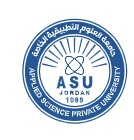Applied Science Private University is funding opportunities for the future

Sponsored by

Sponsored by

Jordan’s Applied Science Private University looks to boost funding opportunities
Since its foundation in 1989, Applied Science Private University (ASU), the largest private university in Jordan, has established a reputation as one of the best institutions in the country and the wider Middle East region. ASU’s nine faculties attract students from Jordan, the Middle East and beyond, with 50 nationalities represented by the student body.
As ASU looks to grow further, the institution is seeking to boost the funding opportunities available to students, graduates and faculty. Thair Kaddumi, head of ASU’s quality assurance and accreditation office, explains the funding available at ASU. One type is scholarships, which come in the form of discounts on fees that can range from 50 to 100 per cent depending on the programme and the student’s academic performance.
“In addition, we give full scholarships to some students, mainly of Sharia and Islamic Studies. Eighty-five per cent of these students pay only registration fees. Otherwise, ASU subsidises all fees,” Kaddumi says. Grants are also offered to high-performing sports students.
ASU offers social scholarships to students from low-income backgrounds, Kaddumi says. ASU’s location allows it to serve students from neighbouring countries, including Palestine, Iraq and Syria. Mohammed Idris, assistant dean of the faculty of business, points to the grants and full scholarships offered to Iraqi students at the faculty.
The faculty offers support for low-income and high-performing students, with grants ranging from 20 to 60 per cent of fees. “The funding is substantial...At the business faculty, it reaches JOD 1m (£1.04m),” Idris says.
ASU is working to grow its funding for research. Mohammad Al Najjar, dean of scientific research and graduate studies, says ASU is looking to boost the number of ASU-authored research papers published in citation database Scopus through a “clever scholarship”.
The scholarship is open to graduates and offers JOD 500 (£522) per published paper. Graduate students can also help with tutoring and labs to receive a 50 per cent discount on fees, and a grant of JOD 100 (£104) per month is available.
Since 2020, Najjar has worked on obtaining funding to support ASU in increasing its research collaboration with other universities. The efforts of Najjar and his colleagues are beginning to pay off, with three university partnerships recently announced, namely Qatar University, Khalifa University and Imam Abdulrahman Bin Faisal University.
“This coming academic year, we are allocating extra money for any faculty member who works collaboratively or publishes papers with any colleagues outside Jordan,” Najjar says.
ASU’s growth strategy is seeing results. The number of enrolled students has grown from 5,800 last academic year to 6,600 this year, and three faculties – law, information technology and nursing – have reached the capacity allowed by higher education regulations. Further, the current academic year is the first where female students have outnumbered the male cohort, reaching 51 per cent of the total enrolled.
Looking forward, Kaddumi says ASU plans to add further categories to the funding schemes, including for students with disabilities and special needs. “Our facilities are equipped for this, but we don’t yet have this funding category,” Kaddumi says. Marketing is to be extended to attract more international students and new academic programmes are planned for the 2022-23 academic year.
Idris expects the boost to funding for students and staff will encourage “innovative projects”, while Najjar plans to increase external funding for research by moving ASU’s collaborations beyond the Middle East, towards Europe and the US. “We now have good faculty and staff well-established for research purposes,” he says.
Find out more about ASU.